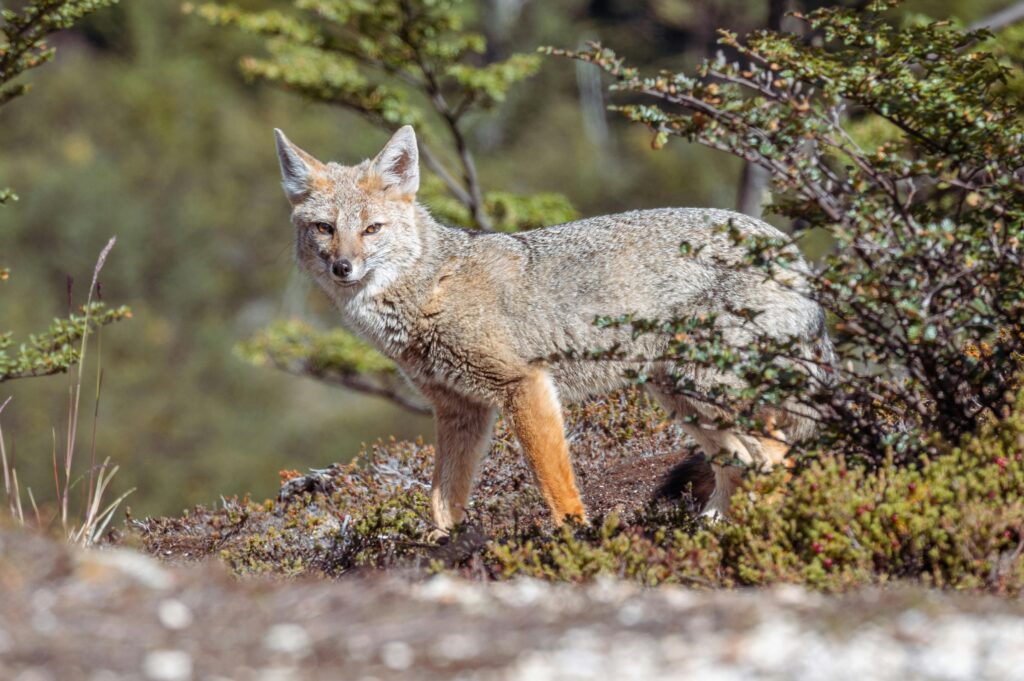
¡Hola, amigos! This is the first post in my new “LITERATURA Y DEBATES” section. If your Spanish is very advanced and you don’t need any help, click here to view this post entirely in Spanish.
Andean oral tradition has passed down a wide variety of myths, legends, and fables. Each story has different versions depending on the region it comes from, incorporating unique elements from local folklore and customs.
Although the animal characters may vary, the essence and narrative structure remain the same. A good example is “The Fox and the Guinea Pig,” which appears in various Hispanic American regions with the same basic plot but multiple variations in details.
The most well-known version tells the story of a clever guinea pig who manages to trick a fox several times. For this post, I chose the version featured on the cultural YouTube channel of the University of Cuenca, Ecuador, which you can watch here: https://www.youtube.com/watch?v=K7Bvi6zMDWk
I extracted the audio and added the transcript, which you can listen to and read below. Also, I divided the text into sections so I could provide an English translation under each fragment.
Additionally, if you want, I can send you a document with challenging questions to help you improve your Spanish even more. And, of course, the best part will be our next class, where we’ll have a stimulating debate about this story.
IMPORTANTE: Este sitio web es exclusivamente para fines educativos y está dirigido sólo a mis estudiantes. Aunque mi sitio web está disponible en internet, el contenido es de uso privado para mis alumnos. No tengo la intención de infringir ningún derecho de autor y siempre proporciono enlaces a las publicaciones originales. Siempre adapto estas obras con un enfoque educativo, sin fines comerciales.
Hace ya algún tiempo, había un campesino que tenía una chacra muy hermosa. Pero un día, encontró sus plantas rotas y a medio comer.
Some time ago, there was a farmer who had a very beautiful small farm. But one day, he found his plants broken and half-eaten.
“¿Quién se ha comido mi cosecha? Tengo que poner una trampa”. Para atrapar a quien estaba destruyendo su chacra, el campesino construyó una trampa, la puso en un lugar adecuado y esperó.
“Who has eaten my crops? I have to set a trap.” To catch whoever was destroying his small farm, the farmer built a trap, placed it in a suitable spot, and waited.
A la media noche, escuchó unos gritos. Alguien había caído en la trampa. Al día siguiente, el campesino corrió a su chacra y se encontró con el culpable. “Ah, ¿con que tú has sido el ladrón de mi chacra, cuy condenado? Ya vas a ver: mañana serás nuestro almuerzo por ladronzuelo. ¡Ja,ja, ja, ja!”.
At midnight, he heard some screams. Someone had fallen into the trap. The next day, the farmer ran to his small farm and found the culprit.
“Ah, so you have been the thief of my small farm, you damned guinea pig? You’ll see: tomorrow you’ll be our lunch for being a little thief. Ha, ha, ha, ha!”
El campesino lo amarró a una estaca, regresó a su casa y pidió a una de sus hijas que hirviera agua para pelar al cuy. “Hmm. Qué rico. Voy a comer cuysito con papas”.
The farmer tied him to a stake, returned home, and asked one of his daughters to boil water to skin the guinea pig. “Hmm. How delicious. I’m going to eat little guinea pig with potatoes.”
El cuy, amarrado a la estaca, forcejeaba, mordía inútilmente la soga, y hasta que se dio por vencido a su cruel destino. De repente, apareció un zorro que le preguntó: “¿Qué te sucedió, compadrito?”.
The guinea pig, tied to the stake, struggled, bit the rope in vain, and finally gave up on its cruel fate. Suddenly, a fox appeared and asked him, “What happened to you, little buddy?”
“El campesino me tiene amarrado y quiere que me case con una de sus hijas hasta que aprenda a comer la gallina, porque esta familia sólo come gallinas. Compadre, a ti te encantan las gallinas. ¿Por qué no me desatas y te pones en mi lugar? Así comerás carne de gallina todos los días, accediendo a casarte con una de sus hijas. Te haré ese favor”.
“The farmer has me tied up and wants me to marry one of his daughters until I learn to eat chicken, because this family only eats chickens. Buddy, you love chickens. Why don’t you untie me and take my place? That way, you’ll eat chicken meat every day by agreeing to marry one of his daughters. I’ll do you that favor.”
El zorro, muy contento y agradecido, desató al cuy y se amarró en su lugar. Al día siguiente, al llegar el campesino en su chacra, con un cuchillo en la mano, muy grande fue su sorpresa cuando vio a un zorro amarrado.
The fox, very happy and grateful, untied the guinea pig and tied himself in his place. The next day, when the farmer arrived at his small farm with a knife in hand, he was very surprised to see a fox tied up.
“Qué raro. Ayer eras un cuy y ahora eres un zorro”. Fue ahí que el campesino agarró a latigazos al zorro, hasta que el pobre gritó con todas sus fuerzas: “Ah, sí me casaré… Sí me casaré”.
“¿Qué carajo hablas, zorro? ¿Por qué gritas esas palabras?”.
“That’s strange. Yesterday you were a guinea pig, and now you’re a fox.” Then the farmer whipped the fox until the poor animal screamed with all its might: “Ah, yes, I will marry… Yes, I will marry.”
“What the hell are you talking about, fox? Why are you shouting those words?”
El zorro le explicó todas las mentiras del cuy. El dueño se puso a reír y después lo soltó, un tanto arrepentido de haber descargado su ira con el zorro. Desde ese día, el zorro comenzó a buscar al cuy, porque quería cobrarse la revancha de todos los latigazos que recibió.
The fox explained all the lies the guinea pig had told him. The owner started laughing and then released him, somewhat regretful for having taken out his anger on the fox. From that day on, the fox began looking for the guinea pig because he wanted to get revenge for all the lashes he had received.
Un día, se topó con él, y pensó que había llegado la hora de la venganza. El cuy, viendo que ya no podía huir, se puso a empujar una enorme roca y el zorro se le acercó para cumplir su cometido.
One day, he ran into him and thought the time for revenge had come. The guinea pig, seeing that he could no longer escape, began pushing a huge rock, and the fox approached to carry out his purpose.
Pero el cuy reaccionó: “Compadre zorro, a tiempo has venido. Tienes que ayudarme a sostener esta roca. La tierra se va a voltear y esta roca puede aplastarnos a todos”.
But the guinea pig reacted: “Buddy fox, you’ve come just in time. You have to help me hold this rock. The ground is going to flip over, and this rock could crush us all.”
Al comienzo, el zorro dudaba, pero la cara de asustado que ponía el cuy terminó por convencerlo. Y empezó a ayudarlo. Es decir, a sostener la gigantesca roca. Después de un rato, el cuy le dijo: “Compadre, mientras tú empujas, yo voy a buscar una piedra grande. Un palo para acuñar esta roca”.
At first, the fox hesitated, but the scared look on the guinea pig’s face finally convinced him. So, he began to help him—that is, to hold up the huge rock. After a while, the guinea pig said, “Buddy, while you push, I’ll go find a big stone—a stick to wedge this rock.”
Pasó un día, dos días, y el cuy no volvía con la cuña para sostener la piedra. El zorro ya no podía más. “Soltaré la roca, aunque me mate”, pensó. Dio un salto hacia atrás. Pero la roca ni se movió. “¡Maldito cuy, otra vez me ha engañado! Pero ésta será la última, ¡porque lo voy a matar!”.
A day passed, two days passed, and the guinea pig didn’t come back with the wedge to hold the rock. The fox couldn’t hold on any longer. “I’ll let go of the rock, even if it kills me,” he thought. He jumped back. But the rock didn’t move. “Damn guinea pig, he tricked me again! But this will be the last time, because I’m going to kill him!”
Una noche, que estaba en busca de comida, se encontró al cuy, en el borde de un pozo de agua. El cuy al verlo, comenzó a lloriquear.
One night, while searching for food, he came across the guinea pig at the edge of a water well. Seeing him, the guinea pig began to whimper.
“Qué mala suerte tienes, compadre, que te estaba llevando un queso grande, pero se ha caído en este pozo”. El zorro se asomó y vio en el agujero el reflejo de la luna llena.
“You’re so unlucky, buddy. I was bringing you a big cheese, but it fell into this well.” The fox looked down and saw the reflection of the full moon in the hole.
“¡Ése es el queso”.
“Tenemos que sacarlo”.
“Vamos a hacer esto, compadre. Usted entra cabeza abajo y yo le sujeto de los pies”.
“That’s the cheese.”
“We have to get it out.”
“Here’s what we’ll do, buddy. You go in headfirst, and I’ll hold you by the feet.”
Y lo hicieron por un buen rato. El cuy, agarrándolo, dijo:”¡Ay, usted es muy pesado, compadre! ¡Ya casi no puedo aguantarlo!”.
Dicho esto, lo soltó. El pobre zorro, gritando de cabeza, cayó en el pozo. Y así cuentan que el inocente zorro murió ahogado.
They did this for quite a while. The guinea pig, holding on, said, “Oh, you’re very heavy, buddy! I can hardly hold you anymore!”
With that, he let go. The poor fox, screaming, fell headfirst into the well. And that’s how they say the innocent fox drowned.
_______________________________
Now that you’ve read the story, let’s get ready to work with it! First, here’s a glossary with 30 expressions you can learn or relearn:
Glossary
-
campesino – farmer / peasant.
- A person who works in agriculture, usually on a small farm.
-
chacra – small farm / plot of land.
- A small agricultural farm or piece of land used for farming.
-
cosecha – harvest / crop.
- The gathering of mature crops from the fields.
-
trampa – trap.
- A device or setup to catch animals or people.
-
adecuado – suitable / appropriate.
- Something that fits well for a particular purpose or situation.
-
culpable – guilty / culprit.
- Responsible for a fault or crime.
-
condenado – damned / cursed.
- Used to describe someone as wicked or unfortunate (often colloquial).
-
almuerzo – lunch.
- The meal eaten around midday.
-
amarró – tied (past tense of “atar”).
- To fasten or bind with rope or string.
-
estaca – stake.
- A wooden or metal stick driven into the ground for support or fastening.
-
pelar – to peel / to skin.
- To remove the outer layer or skin of something.
-
forcejeaba – was struggling.
- To make violent efforts to escape or resist.
-
inútilmente – uselessly / in vain.
- Without success; without producing the desired effect.
-
cruel – cruel.
- Causing pain or suffering intentionally.
-
compadrito – little buddy / pal (colloquial).
- An affectionate term for a close friend or companion.
-
desatar – to untie / to loosen.
- To undo something that was tied or fastened.
-
latigazos – lashes / whip strikes.
- Blows given with a whip or similar object.
-
arrepentido – regretful / sorry.
- Feeling sorry for something done wrong.
-
descargar (su ira) – to vent (his anger).
- To release strong emotions, especially anger.
-
revancha – revenge.
- The act of retaliating or getting even for a wrong.
-
empujar – to push.
- To apply force to move something away.
-
sostener – to hold / to support.
- To keep something in place or support its weight.
-
cuña – wedge.
- A piece of material used to hold something firmly in place by fitting tightly.
-
aplastar – to crush.
- To press something with force so it breaks or becomes flat.
-
lloriquear – to whimper / to whine.
- To cry softly or complain in a weak voice.
-
pozo – well (water well).
- A deep hole dug or drilled to access water underground.
-
asomó – looked out / peered.
- To appear partially or look from a hidden place.
-
reflejo – reflection.
- An image seen in a mirror, water, or shiny surface.
-
cabeza abajo – head down / upside down.
- Position where the head is pointing downward.
-
ahogado – drowned.
- Having died by suffocating under water.
What do you think the main lesson is? There are many ways to interpret it. Some people say it shows how sad it is when an innocent person is tricked. Others believe it teaches that in real life, cleverness often beats strength. What’s your take? We’ll explore all these ideas in our next lesson.
Also, if you’d like, I can send you a document with questions to help you practice writing and organize your thoughts for a stronger discussion. Just let me know!




